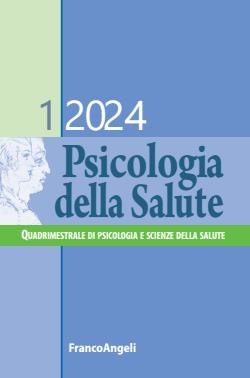
Come avviarsi alla pratica del pacchetto statistico
cod. 1585.7

Come avviarsi alla pratica del pacchetto statistico
cod. 1585.7

Il fumo è molto comune tra gli adolescenti: essi iniziano a fumare sempre più presto, anche prima dei 15 anni. Ciò rende sempre più necessaria l’implementazione di efficaci strategie di prevenzione primaria del tabagismo a partire dalla preadolescenza. Per questi motivi la Sezione Milanese della Lega Italiana per la Lotta contro i Tumori ha strutturato un intervento, denominato "Specchio Riflesso", basato sulla tecnica del teatro sociale e finalizzato a facilitare una esperienza in cui osservarsi, scoprirsi nella propria individualità e dentro un gruppo, avendo come punto di arrivo e confronto quello di una esplicitazione rispetto al tabagismo. Obiettivo di questo studio è stato di indagare la sua efficacia. 191 alunni hanno partecipato al progetto, realizzato in due incontri in classe prima e due in classe seconda della scuola secondaria di primo grado. Gli atteggiamenti e le emozioni, sia positive che negative, attribuite ai fumatori e le convinzioni d’efficacia nel resistere alle pressioni dei pari e di esprimere le proprie opinioni sono stati misurati tramite questionari. Un gruppo di controllo di 324 preadolescenti che non hanno partecipato a Specchio Riflesso (SR) è stato confrontato col gruppo che ha ricevuto l’intervento. I risultati dimostrano l’efficacia di SR nel contrastare l’attrattività del fumo, ostacolando la formazione di emozioni e atteggiamenti positivi verso il fumo e favorendo una maggiore assertività e le convinzioni circa la capacità di esprimere le proprie opinioni. In generale, SR si dimostra un efficace intervento di prevenzione primaria del tabagismo facilmente integrabile nelle attività formative previste durante la scuola secondaria di primo grado.

Uno spaccato completo (ed unico nel suo genere) della società italiana e di alcune delle problematiche che maggiormente la caratterizzano. Universalismo, Benevolenza, Conformismo, Tradizione, Sicurezza, Potere, Successo, Edonismo, Stimolazione e Autodirezione: una riflessione accurata sulla presenza di tali valori a livello individuale, di Paese e di Cultura.
cod. 1420.1.121

Life goals, personal values and individual well-being: an empirical study - People fell happier and more satisfied when they have the possibility to devote themselves to the achievement of their life-goals, the most important goals usually reflect high-priority values that function as life guides. Main aim of the present study, involving 240 Italian adults, was to investigate the relationships among personal values, life-goals, and individual wellbeing. We identified various types of people considering their personal values and life-goals; they were then compared on four well-being indicators: life satisfaction, self-esteem, optimism, and hedonic balance. The pursuit of "relational" life-goals, supported by universalism and benevolence values, promotes higher levels of self-esteem and life satisfaction.

La soddisfazione lavorativa dei professionisti della salute - Job satisfaction of health professionals Health profession has been traditionally considered as one of those professions at risk for psychological distress. While remarkable interest has been devoted to the burn-out syndrome, only recently have scholars and policy makers begun to pay attention to the factors promoting health professionals’ satisfaction and gratification. Aim of the present study was to investigate general and domain-specific job satisfaction among 906 physicians and nurses working in various Italian hospitals. The influence of four variables on job satisfaction was investigated: type of profession (physicians vs. nurses), job seniority, the desire to change job, and the desire to change work place. Participants’ suggestions to improve their ward and to increase their personal satisfaction were collected through open-ended questions. Results showed that physicians were more satisfied with their job than nurses, and that senior professionals were more satisfied than junior professionals. General satisfaction for the ward was mostly associated with leadership satisfaction and satisfaction with relationships with colleagues and superiors; negative and modest correlations were found between job satisfaction and burn-out. A material improvement of the ward, more personnel and an improvement in the relationships among colleagues were reported more frequently as the most important factors in order to improve the ward functioning. Higher salary and more adequate shifts and work load were reported more frequently as the most important factors in order to increase personal job satisfaction. Key words: job satisfaction, health professionals.


This article presents the concept of post-traumatic growth, its theoretical foundations and some methodological issues concerning empirical research. Posttraumatic growth is the experience of positive change that occurs as a result of the struggle with highly challenging life crises (Tedeschi, Calhoun, 2004). The idea that there is a personal gain in suffering is ancient. However, only recently the topic of growth following adversity has become the focus of theoretical and empirical work (Helgeson et al., 2006). Growth has been reported following a wide range of stressful and traumatic events (Linley, Joseph, 2004) and the positive changes observed after these events have been variously labelled. Growth after adversity seems to have three main interconnected facets: personal identity, interpersonal relationships and life philosophy. There are three main theoretical perspectives on adversarial growth: the functional-descriptive model of Tedeschi and Calhoun (2004), Christopher’s biopsychosocial-evolutionary view (2004) and the Organismic Valuing Theory of Growth of Joseph and Linley (2005). Although much remains to be learned, the process of growth is an interesting topic for the movement of Positive Psychology that aims at providing an integrative perspective on both the positive and the negative aspects of human experience (Seligman, Csikszentmihalyi, 2000).


Interpersonal relationships play a crucial role in the promotion of individual well-being; a number of studies demonstrate that positive relationships with others, especially with family members and the partner, exert a positive influence on physical health and on various aspects of psychological and subjective well-being. Main aim of the present study was to investigate the role of interpersonal relationships in promoting subjective well-being, in terms of life satisfaction, self-esteem, optimism and hedonic balance. 520 men and 493 women, ranging in age from 20 to 87 years old, participated to the study; all they were married or involved in an intimate and stable relationship. Quality of relationships with family members, with the partner, with friends, and membership to various types of associations were used to identify seven types of people; each type was characterized by a specific interpersonal profile. Significant differences among clusters were found in well-being indicators; a low well-being was reported by people belonging to clusters with negative interpersonal profiles, whereas high life satisfaction, self-esteem, optimism, and hedonic balance were reported by people with good interpersonal relationships. Furthermore, relationships with family members and the partner were more important in the promotion of well-being than relationships with friends and the membership to associations.

Health professions are characterized by high stress and risk of burnout, as a consequence of the many situations and tasks doctors and nurses have to face in their daily work activities. Aim of present study is to present the first validation of the Health Professions Stress and Coping Scale (HPSCS), a new instrument created to assess the stress and coping strategies doctors and nurses adopt in facing 24 specific situations characterizing their job. The HPSCS is designed to evaluate four coping mechanisms: focus on problem, focus on emotion, search of social support, and avoidance. 64 doctors and 99 nurses belonging to various Italian hospitals participated to the study. Results showed the good capacity of the HPSCS to assess the level of stress perceived in specific job situations both for doctors and nurses. Doctors and nurses use different coping strategies; however when the stress is high, both are more prone to adopt disadaptive mechanisms. Finally we identified four clusters of doctors and nurses, characterized by a different use of the two adaptive and the two disadaptive coping strategies.



Aim of the present study is to validate, in the Italian context, the Volunteer Functions Inventory (V.F.I.), developed by Omoto and Snyder (1995) in the American context. V.F.I. assess the main motivational functions that drive individuals to begin and continue volunteer-ism activity. Partecipants were 508 volunteers, 182 males and 326 females, that provide dif-ferent kinds of social services. Principal components analysis and item analysis were con-ducted to demonstrate the validity of the inventory. The inventory’s factorial structure is been further investigated through the confirmatory factor analysis. Results show a six dimen-sions structure, confirming the results obtained by the American researchers. Multivariate and univariate analysis of Variance show gender and age differences for the six V.F.I.’s di-mensions. Finally, the validity of the scale is been probed measuring the correlations between the six motivational functions and two external criteria: the length of the service and the organ-izational integration. Keys: volunteerism, motivations.


Il contributo della Psicologia Positiva
Il volume raccoglie i contributi di studiosi che oggi in Italia si occupano di psicologia positiva, attraverso programmi di ricerca e di intervento centrati su temi – quali il benessere, l’ottimismo, le esperienze ottimali, l’empowerment, la resilienza, l’auto-determinazione – che da qualche anno suscitano un crescente interesse sia nell’ambito accademico sia in quello professionale. Il benessere viene qui inteso non come soddisfazione di bisogni soggettivi e conseguimento di obiettivi personali, ma come condizione ottimale che scaturisce da un’integrazione armonica tra crescita individuale e sviluppo culturale. Il testo intende offrire una panoramica aggiornata sugli studi e sulle applicazioni in psicologia positiva. Antonella Delle Fave, medico, specialista in psicologia clinica, è professore di psicologia generale presso la Facoltà di Medicina e Chirurgia dell’Università di Milano.
cod. 1240.297

Research and intervention
cod. 2000.1047